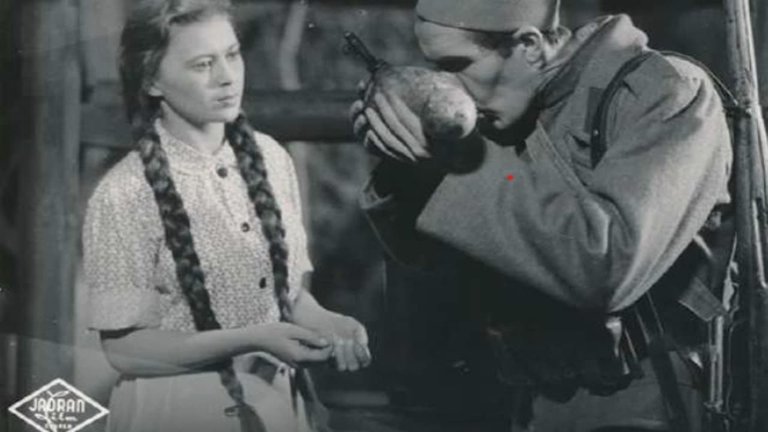Film Review: The Unconquered People (Živjeće ovaj narod, 1947)

The complex history of 20th Century Croatian cinema is mirrored in the convoluted times that shaped the nation's past. As a country, Croatia's cinema was entwined with the broader Yugoslav film industry, making it challenging to disentangle which films belonged to which category. The first Croatian feature film, Lisinski, a biopic released in 1944, is a prime example of this issue. Although it is now widely acknowledged as a Croatian film, its pro-Nazi regime affiliations and suppression during the Communist era cast a shadow over its legitimacy. In contrast, Živjeće ovaj narod, a 1947 war epic directed by Nikola Popović, would have been more palatable to the Yugoslav Communists. This film, which translates to "This People Shall Live" or "This Nation Shall Live", underwent a name change during its brief US distribution, emerging as The Unconquered People.
Živjeće ovaj narod is a significant film in the history of Yugoslavia, marking the second post-WW2 feature film after the more well-known Slavica and the obscure 1946 Soviet co-production In the Mountains of Yugoslavia. Like those two earlier films, it deals with recent events in Yugoslavia during WW2 and is an early representative of the specifically Yugoslav genre that would later become known as the "Partisan film". Its Croatian designation stems from being the first feature production of Jadran film, a Zagreb-based studio that would soon become a powerhouse of the Yugoslav film industry and renowned for international co-productions.
However, it would be difficult for an audience to notice that this film was "Croatian" without prior knowledge. The script was written by Branko Ćopić, a renowned Bosnian Serb writer whose work reflected his experiences as a Yugoslav Partisan. The plot is set in Ćopić's native area of Western Bosnia and covers roughly the first two years of the war. The film begins in April 1941 following the Axis invasion of the Kingdom of Yugoslavia, and the incompetence, defeatism, and treachery of the Yugoslav leadership leads to a quick surrender to the fascist invaders. The collaborationist fascist regime of the Independent State of Croatia is established, with its militia, the Ustashas, persecuting the local Serb population. Some soldiers refuse to give up their arms, and when the Communist Party of Yugoslavia launches an uprising, they find that the local people would enthusiastically support their cause. The new guerilla force, the Partisans, confronts the Germans, Ustashas, and local Serb pro-Axis faction known as the Chetniks, and although manages to score victories, they take heavy toll in lives within their ranks and among ordinary people.
Like Slavica and other early Partisan films, Živjeće ovaj narod is steeped in Communist propaganda and clearly intends to justify the post-war regime by reminding viewers of its role in the victory over foreign invaders. The film is also heavily influenced by Socialist Realist doctrine, with the collective given more importance than the individual. The film lacks a nominal protagonist, instead featuring a generic "people" represented by a large number of minor characters in small vignettes that give the film an episodic nature.
However, Živjeće ovaj narod partially strays from this approach to promote the official doctrine of "Brotherhood and Unity" in Communist Yugoslavia, showing that the struggle against fascism was multi-ethnic in nature. The character of Jagoda, a local Bosnian Serb girl, enthusiastically supports the Partisans and falls in love with Ivan, an ethnic Croat Partisan specialized in blowing up enemy trains. This romantic subplot is one of the two more cohesive elements in the plot, the other being the character of Jagoda's grandfather, who serves as a comic relief in a story that is often quite tragic.
Inevitable comparisons with Slavica show Živjeće ovaj narod as a much more accomplished film in strictly technical terms. This is hardly surprising, given that Croatian cinematographer Oktavijan Miletić, director of Lisinski, was one of the most experienced filmmakers in the country at the time. Croatian composer Fran Lhotka also provides an effective musical score, using folk motives as well as popular Partisan songs.
Serbian director Nikola Popović apparently learned a bit from the mistakes of his colleague Vjekoslav Afrić (who briefly appears in coveted role of Partisan leader Tito) in Slavica. The most important was abandonment of stage techniques in favour of the film-like direction and acting, with less obvious makeup. This benefited greatly Vera Ilić, a young Serbian actress whose charm and enthusiasm transcend the ideological limitations of her role. Veteran Croatian stage actor Fran Novaković is also very good in the role of her grandfather.
There are some scenes that look a little cringe-like, such as the one in which masses of women and children armed with clubs and agricultural tools take on heavily armed German soldiers. However, the general impression is mostly positive. Živjeće ovaj narod nevertheless lacked the novelty of Slavica and failed to arouse the imagination of the Yugoslav audience and become part of popular culture. In subsequent decades, it was often overlooked or dismissed as mere propaganda. However, recent critical re-evaluation has recognized its historical significance and rightful place in the canon of early Yugoslav cinema.
RATING: 6/10 (++)
Blog in Croatian https://draxblog.com
Blog in English https://draxreview.wordpress.com/
InLeo blog https://inleo.io/@drax.leo
Hiveonboard: https://hiveonboard.com?ref=drax
Rising Star game: https://www.risingstargame.com?referrer=drax
1Inch: https://1inch.exchange/#/r/0x83823d8CCB74F828148258BB4457642124b1328e
BTC donations: 1EWxiMiP6iiG9rger3NuUSd6HByaxQWafG
ETH donations: 0xB305F144323b99e6f8b1d66f5D7DE78B498C32A7
BCH donations: qpvxw0jax79lhmvlgcldkzpqanf03r9cjv8y6gtmk9
Congratulations @drax! You have completed the following achievement on the Hive blockchain And have been rewarded with New badge(s)
You can view your badges on your board and compare yourself to others in the Ranking
If you no longer want to receive notifications, reply to this comment with the word
STOPCheck out our last posts: